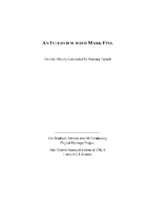Search the Special Collections and Archives Portal
Search Results

Transcript of interview with Mark Fine by Barbara Tabach, November 18 and December 2, 2014
Date
Archival Collection
Description
Interview with Mark Fine in two sessions, November 18 and December 2, 2014. In the first session, Fine begins by talking about his sons and their business interests, then discusses his own childhood growing up in Cleveland. Fine moved to Arizona as a teenager and attended the University of Arizona for college. After college, he moved to New York city, and describes his employment at Chemical Bank, and then at the investment firm Loeb, Rhoades. He was married and started a family in New York City, then moved to Las Vegas to assist in his in-laws' (the Greenspuns) business ventures, which included real estate development and Sun Outdoor Advertising. Fine talks about Las Vegas in the 1970s and building Green Valley and Summerlin, the "social engineering" aspects of developing a community and the importance of building incrementally. In Part II of the interview, Fine discusses his family history and raising his children in Las Vegas. He talks about the growth of the Jewish community and ph
Mark Fine was born in 1946 in Cleveland, Ohio, and was raised with a strong Jewish identity. When Mark was in fourth grade, his parents moved the family to Shaker Heights, and again moved to Arizona during his senior of high school. Upon graduation, Mark enrolled at the University of Arizona and became a member of the ZBT fraternity; determined to graduate in four years, he finished in 1964 with a degree in business administration with an emphasis in real estate. Though never having been, Mark took his degree to New York City and established a career on Wall Street, first working for Chemical Bank. In 1969, Mark married Susan Greenspun, and soon after, the couple had their first child. By this time, Mark had taken a new position with Loeb, Rhoades and Company, and worked there for nearly five years in their corporate finance department. In 1973, Mark moved to Las Vegas to assist his father-in-law, Hank Greenpun, with his nonnewspaper business operations, largely under the auspices of American Nevada Corporation. Mark soon capitalized on this passion for real estate and community development, leading several integrated real estate projects to create the Green Valley area, the city's first large-scale master-planned community. Mark went on to launch a similar project in Summerlin, and at one point, he was leading the development of the country's two fastest selling planned communities (Green Valley and Summerlin). Ultimately, Mark became one of state's prominent real estate developers, and continues to lead significant projects positively impacting the city's growth and appeal. His fundamental goal has always been to create a sense of place, to develop thriving communities with generational stamina. His success in this endeavor is recognized, in part, with the naming of Mark L. Fine Elementary School. Over the years, Mark has also been an important member of the Jewish community, among the "second generation of pioneers," coming after those heavily involved with the hotels during the 1950s and 1960s. He served on the Temple Beth Sholom board of directors, and initiated events to bring older and younger generations of the Jewish community together in meaningful ways. Mark has five children?Alyson Marmur, Katie Erhman, Jeffrey Fine and Jonathan Fine and Nicole Ruvo Falcone?and is married to Gloria Fine.
Text

Transcript of roundtable interview with members of Temple Beth Sholom by Barbara Tabach, January 14, 2015
Date
Archival Collection
Description
In this roundtable discussion, members of Temple Beth Sholom discuss the history of the long-established congregation. Interviewees are Sandy Mallin, Oscar Goodman, Jared Shafer, Joel Goot, Arne Rosencrantz, Jerry Blut, Jackie Boiman, Gene Greenberg, and Flora Mason, with Shelley Berkley joining in later in the interview. Most of the interviewees have been involved in the leadership of the congregation. They discuss relationships with various rabbis over the years, and successful fundraising efforts to build the original synagogue. Other early leaders in the congregation were Edythe Katz-Yarchever, the Goot family, Stuart Mason, Herb Kaufman and Leo Wilner. Until the 1980s, Temple Beth Sholom was the only synagogue in Las Vegas, but after a dispute over the burial of a non-Jew, a new synagogue formed (Shareii Tefilla), and at nearly the same time, Temple Beth Sholom began investigating a move from their site on Oakey Boulevard. Most have nostalgia for the former location, but discuss the changes in the neighborhood that necessitated the move to Summerlin. Then they discuss the other initiatives that were borne out of Temple Beth Sholom, such as bond drives for Israel, B'nai B'rith, and the Kolod Center. They share other memories, then discuss the leadership and Sandy Mallin becoming the first female president of the temple. They credit Mallin with keeping the temple going through lean years, and helping to recruit Rabbi Felipe Goodman. The group goes on to mention other influential members of the Jewish community including Jack Entratter and Lloyd Katz, who helped integrate Las Vegas.
Text

Transcript of interview with Michael S. Mack by Barbara Tabach, May 20, 2015
Date
Archival Collection
Description
In this oral history Michael Mack discusses his early memories of Las Vegas such as attending the Fifth Street School and activities him and his friends participated in. The interview also includes his memories of different members of the Mack family and their activities. He reminisces about his many visits to the Flamingo Hotel as well as being taken by his parent to floor shows. He also discusses what it was like to grow up Jewish in Las Vegas and the way Jews helped build the community.
Text

Transcript of interview with Michael J. Shane by Barbara Tabach, October 26, 2016
Date
Archival Collection
Description
Michael Jay Shane is a natural musician and entertainer. Born in New York City in 1961, Shane is a graduate of the famous High School of Performing Arts, and later attend Peabody Conservatory of Music, before leaving to launch his musical entertainment career full-time. Shane has had a varied and full career ever since as a musical entertainer, working as emcee, comedian, voiceover actor, and musician, showcasing the piano, guitar, saxophone, clarinet as well as vocals. He moved to Las Vegas in 1995, and jobs have included playing the piano at Wynn?s Tower Suite Bar, Bootlegger, and currently, Italian American Club. In this interview, Shane shares about his family and a childhood filled with music. He discusses his career trajectory, and the influence Judaism has had in his upbringing and work. He details differences between working in New York City and Las Vegas, what makes Las Vegas unique for any musician or musical entertainer, and talks about changes in the local entertainment scene since corporations took over the gaming industry. He also shares stories about his career, including working with Jerry Lewis and following Andrew Dice Clay?s standup act.
Text

Transcript of interview with Lovee duBoef Arum by Barbara Tabach, November 1, 2016
Date
Archival Collection
Description
Lovee Arum is the Chief Financial Officer of the Morris A. Hazan Family Foundation and Director of Hospitality for her husband Bob Arum?s boxing promotion company Top Rank. She holds a Nevada Real Estate Broker Sales License and was a partner in Western Linen (a Las Vegas linen rental and laundry company) for many years. Arum is a volunteer and philanthropist in the Las Vegas, Nevada community and works with organizations such as Temple Beth Sholom and the Nathan Adelson Hospice. In this interview, Arum reflects upon her childhood in Beverly Hills, California, and first experiencing Las Vegas after her father, Morris Hazan, established Western Linen. She discusses adjusting to Las Vegas life after moving to the city with her first husband, Larry duBoef, in 1963, and raising her daughter and son within the local Jewish community. Arum also talks about meeting her current husband, Bob Arum, and her various philanthropic activities, including Junior League, United Jewish Appeal, Keep Memory Alive and establishment of the Lou Ruvo Center for Brain Health.
Text

Transcript of interview with Hershel Brooks by Barbara Tabach, December 8, 2016
Date
Archival Collection
Description
Hershel Brooks was born December 3, 1930 in Brooklyn, New York. He was raised in an orthodox Jewish household, along with his four siblings, and attended Jewish community schools before pursuing his rabbinical studies. He studied at TelsheYeshiva in Cleveland, Torah Vodaath in New York, and Jewish Theological Seminary in New York. Before assuming his first rabbinical position, Brooks married his wife, Alma, and graduated with his BA from the University of Miami. He was first hired by a conservative congregation in Miami, and subsequently led congregations in Savannah, Georgia, Greensboro, North Carolina and Philadelphia, Pennsylvania. Eventually, he joined a temple in Anaheim, California, where he served for twenty years. In 1996, Brooks retired to Las Vegas. He was soon asked to lead services at Temple Bet Knesset Bamidbar [BKB] twice a month as its rabbi. He still is active at BKB, though he retired in 2011. In this interview, Brooks reflects on his family background and the path that lead to his becoming a rabbi in the Conservative Jewish Movement. He talks about his career, including his involvement with BKB as well as other Jewish community service, including facilitating adult bar mitzvah classes and serving on the local Rabbinical court of Judaism, known as Bet Din.
Text

Transcript of interview with Bruce Isaacson by Barbara Tabach, March 24, 2017
Date
Archival Collection
Description
Bruce Isaacson was born in 1956 in Castro Valley, California to Betty Griffin and Bernard Isaacson, and spent his childhood in Oakland. He received his bachelor?s degree from Claremont McKenna College with majors in economics as well as drama, and continued studying for his Masters of Business Administration at Dartmouth College. After receiving his MBA, Isaacson started a career in finance, focusing on mergers and acquisitions. In 1995, he moved to Las Vegas to pursue a real estate career alongside his father. In June 2015, Isaacson became Clark Country?s first poet laureate to encourage poetry as an art form in Southern Nevada. Although Isaacson began writing poetry at a young age, he wanted to develop his craft further. So he attended Brooklyn College for a Masters of Fine Arts and studied with famed poet Allen Ginsberg. Isaacson is known in the San Francisco Bay Area as organizer and poet in the Cafe Babar readings in the 1980s. He is also a co-founder of Zeitgeist Press, where he remains publisher and co-editor. In this interview, Isaacson discusses his childhood and how he maneuvered his career path from finance into poetry. He talks about applying for and serving as the county?s first poet laureate, and describes the programing he?s started in this capacity. Isaacson also speaks about his earlier involvement with Bay Area poetry scene as well as the impact of his Jewish upbringing on his life and his art.
Text

Transcript of interview with Shawn Willis by Barbara Tabach, May 5, 2017
Date
Archival Collection
Description
Shawn Willis (1972 - ) grew up in a culturally diverse area outside of Detroit, Michigan. She has made Las Vegas her home since 2004. Since moving to Nevada, she ?acknowledged? her Judaism and built a robust network within the Jewish community as an entrepreneur and tireless leader. From 2015 ? 2017, she held the position of Director of the Jewish National Fund of Las Vegas. The Jewish National Fund is a worldwide organization that was founded in 1901 to meet the strategic challenges of building in Israel and developing the infrastructure for ecology, special needs and heritage preservation. Among the local initiatives that Shawn led was a program on water conservation. In this oral history, Shawn candidly speaks of being a convert to Judaism. She also shares how she introduced herself into the Las Vegas community in a vibrant way through her marketing expertise and business. Shawn currently serves on the UNLV Foundation?s President?s Associates Council and is an active person in the Las Vegas community. Shawn is a graduate of University of Detroit Mercy.
Text

Transcript of interview with Justice Michael Cherry by Barbara Tabach, September 19, 2014
Date
Archival Collection
Description
Interview with Justice Michael Cherry by Barbara Tabach on September 19, 2014. In this interview, Justice Cherry talks about how he came to Las Vegas and his work as a public defender and as a lawyer in private practice. He also discusses his involvement with Jewish organizations in various capacities, and his involvement with high-profile cases such as the MGM Grand and Las Vegas Hilton fires, earning him the nickname "master of disaster."
Justice Michael Cherry was born in St. Louis, Missouri, and went on to spend his childhood in the Jewish neighborhood of University City. He attended University of Missouri and became a leader in his fraternity, Alpha Epsilon Pi, and a committed ROTC cadet. By the time Justice Cherry graduated from Missouri and was heading to Washington University School of Law, he was a second lieutenant; halfway through law school, he was promoted to first lieutenant. It was also during law school that he married his college sweetheart, Rachel Wolfson. When a bad back prevented him from becoming an active air force officer, he and his wife decided to follow his mother to Las Vegas. Justice Cherry worked both as a law clerk with the Public Defender's Office as well as a security guard at Wonder World when he first moved to the city. After passing the Nevada bar, Cherry took at position with the Public Defender's Office, and later went into private practice as a successful criminal defense attorney. Cherry was elected as district judge in 1998 and 2002. In 2006, he won his campaign for state Supreme Court justice. Justice Cherry was reelected to office in 2012 for another four-year term. He is currently the highest-positioned Jewish official in the state of Nevada. Throughout his years in Las Vegas, Justice Cherry has been an extremely active and influential member of the Jewish community and served as chairman of the Anti-Defamation League and is active in the Jewish Federation. Justice Cherry attributes his commitment to service to his mother. In addition to his service to the Jewish community, he has been active in numerous other service organizations, including March of Dimes, Olive Crest, Adoption Exchange and American Cancer Society.
Text

Transcript of interview with Jacqueline Baskow by Barbara Tabach, October 24, 2016
Date
Archival Collection
Description
In 1976, Jacqueline "Jaki" Baskow was an aspiring actress when she and a friend accepted an invitation to worked in a movie studio in Las Vegas. She had three-hundred dollars to her name, a dream and lots of dynamic energy. Though the movie studio offer did not quite materialized as she hoped - the invitation had come from Batman co-creator Bob Kane - Jaki's trajectory into Las Vegas, working with talents and planning events became an over forty year career. In this interview, she talks about growing up Jewish in Camden, New Jersey where her father was a murder victim; her tenacious effort to find the perpetrator included the help of celebrity detective Joe Schillaci. She shares stories of the colorful array of A-list entertainers she has worked with to build her successful business, Baskow and Associates. She has built a niche of handling large corporate events, hiring talent and attention to details for exciting events. She reflects on the people and moments that impelled her on; mentors such as Bobby Morris and Frank Sinatra and Jilly Rizzo.
Text
